Retail business involves the direct sale of goods by sellers to customers, who are typically the end users of the product. Although the use of online shopping channels has led to a shift in shopping trends more towards online shopping, however, retail stores have their unbeatable value!
Studies suggest that 49% of consumers like to shop at a physical retail store and try the products before paying for them. And this is so true! Shopping at physical retail stores brings instant gratification and offers a first-hand product experience that most people love. But, it is necessary to build amazing retail store experiences to beat the changing trends.
Retail surveys are a great way to collect customers’ feedback, gauge their experience and take the right action to build excellent retail experiences. To make your surveys effective enough to collect valuable information, you need to choose your questions wisely. In this article, we will cover more than 50 retail survey questions that you can use to collect meaningful feedback from your retail customers. Let’s start with exploring how to use retail surveys.
TL;DR
- The retail industry is shifting with online dominance. Over half of Americans prefer online shopping, but 49% still enjoy the tactile in-store experience. To beat the competition and stay relevant, businesses need to deliver an unbeatable customer experience at their store.
- To improve customer experience in your retail store, measure feelings through feedback and use tailored question types. Ensure surveys are quick and simple for high response rates.
- When designing a customer feedback survey, it's crucial to use effective retail survey questions to gauge various aspects of the customer experience. You can have NPS survey questions, customer satisfaction survey questions, general questions, demographic questions, general retail questions, customer service survey questions, and more.
- Utilizing retail survey software can streamline this process, helping you adapt and excel in the competitive retail industry. Zonka Feedback is a powerful software that can help you create and send retail survey questions to your target audience. You can schedule a demo to get started with it.
Measure Feedback from your customers at Retail Stores
Choose from over 30+ question types, add your own themes and create amazing surveys that people love answering and gauge feedback like never before.

How to use Retail Surveys to Collect Shopper Feedback?
If you want to gather feedback from your customers about their shopping experience with you, the one and only way to conduct Customer Feedback Surveys. These surveys are extremely useful to provide valuable information about the views and perceptions of the customers regarding their in-store experience with a brand and its products and services.
It becomes more important to take surveys for retail businesses as the customers do not take much time to switch to another brand. However, if you are able to satisfy your customers consistently, they become the most loyal customers. 57% of the customers tend to make purchases from a brand they are loyal to.
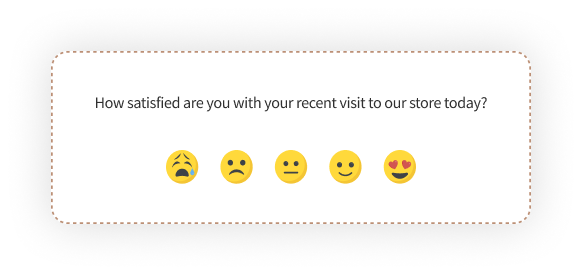
Now, one of the biggest challenges faced in carrying out a retail customer survey is to decide on the questions to be asked to the customers. Well, you can ask various types of questions from your customers depending on your business and its requirements. You should try to collect information about all the aspects of your retail store and customer journey touchpoints like:
- Shopping experience
- Experience with your staff
- Customer service
- Retail store ambiance
- Parking experience
- Billing experience, etc.
However, you should take care that the survey is not so long that the customers don't feel like spending precious time on that. In fact, your customer surveys must be simple and quick to fill. Nowadays, there are Retail Survey Software available in the market that can help you create effective surveys and send them to your customers via different channels. They also come with customer sentiment analytics to help you gather in-depth insights from the data.
Retail Survey Example to Measure Customer Satisfaction
Here is a template of a Customer Satisfaction Survey for retail stores. You can use this template straightaway or customize it as per your requirements to survey your retail store customers.
Here are a variety of questions you can ask your customers in order to have effective feedback data for your retail business. You don't need to ask all of the questions, but you should ask only those that best suit your requirements.
Top Retail Survey Questions Based on Feedback You Want to Collect
- NPS (Net Promoter Score) Question
- CSAT (Customer Satisfaction) Question
- CES (Customer Effort Score) Question
- General Satisfaction Questions
- Demographic questions
- Product related questions
- Staff and Service Feedback questions
- Place, Time & Location related questions
- Billing Feedback Questions
- Pricing Feedback Questions
- Open-ended questions
- Follow-up questions
Let's explore the questions you can ask under these types:
1. NPS (Net Promoter Score) Question
NPS surveys are a great way to gauge the overall satisfaction levels of your customers. It is a single question survey but that single question is an all-in-one question, which is why it's known as The Ultimate Question.
The question is:
- On a scale of 0 to 10, how likely would you recommend our brand to your friends and known ones, 0 being 'Not at all Likely' and 10 being 'Most Likely'?
Customers select an option from 0 to 10 and you get to know how much happy they are with the customer experience they have got. Based on the results of the retail customer feedback that you've received, you can find out your detractors, promoters, and passives.
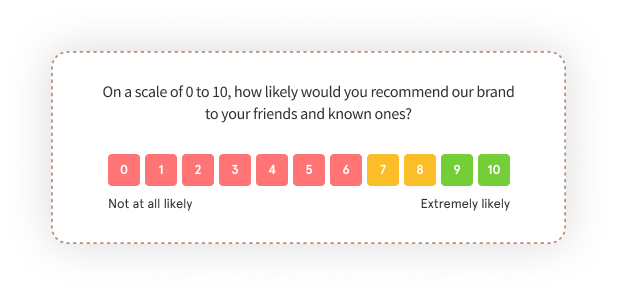
2. CSAT (Customer Satisfaction) Question
CSAT surveys are also a good method to measure Customer Satisfaction. The CSAT question is a prominent retail and eCommerce survey question that is asked of customers. Here is how it goes:
- How satisfied were you with your experience with us?
5 options are given from 'Pathetic' to 'Excellent'. These options can be given in the form of self-explanatory emoticons also.
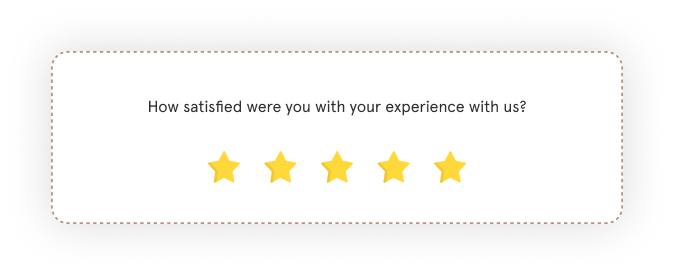
3. CES (Customer Effort Score) Question
Customer Effort Score (CES) is basically to know how much effort your customers have to make with your organization to get their work done. A statement is given to the customers and it is asked how much they agree with that statement.
- How much do you agree with the following statement?: " The company made it easy to handle my issues and get my work done."
Option ratings are given to be chosen by the customer.
%20Question%20for%20retail%20surveys.png?width=782&height=287&name=CES%20(Customer%20Effort%20Score)%20Question%20for%20retail%20surveys.png)
4. General Satisfaction Questions
General satisfaction questions are very simple questions and require the simplest of answers from the customers. These questions are a type of multiple choice questions that require the customers to revert only by selecting a rating among the available options about anything they have been asked.
You can ask these questions from your customers:
- How would you rate the shopping experience you had today?
- How do you rate the behavior and support of the staff at our store?
- How do you rate the ambiance and cleanliness of the store?
- How would you rate the return policies of our store/website?
- Do you feel that the exchange policies of our store/website?
- How would you rate the work of our staff at the billing counter?
- How would you rate our store in terms of ease and quickness of shopping?
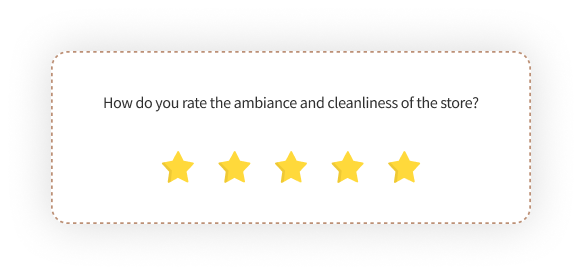
5. Demographic Questions for Retail Store Shoppers
Demographic questions are those that ask the demographic details of the customers. Demographics are basically characteristics of a population of an area or demography. It includes the characteristics of your customers such as race, ethnicity, gender, age, education, profession, occupation, income level, and marital status.
Basically, the purpose of these questions is to know more about your customer base, so that you can do proper segmentation and targeting and are able to satisfy them in a better way.
Here are some demographic questions you can ask your customers.
- What is your age group? (Answer options can be given like 10-18, 19, 25, 26-35, 36-45, 46-60, 60-80, 80 & above, etc.)
- Select your gender.
- Please write the city you live in.
- Please select your educational qualification. (Options like Schooling only, graduate, postgraduate, others, etc.)
- Are you into a business, profession, or a job?
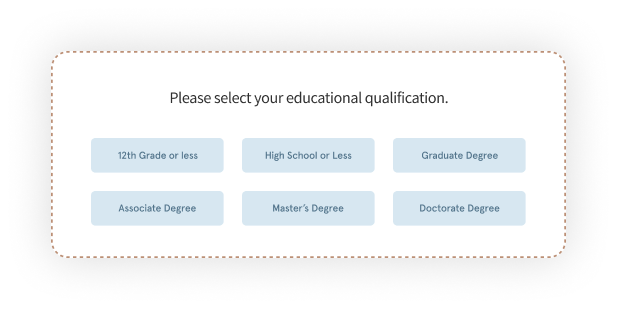
6. Product-related Questions
Product-related questions are focused on taking feedback regarding the products at your retail store or website. Answers to these questions help in product development, product improvement, including new products or varieties in your business, and making business decisions related to products.
Here is what you can ask your retail customers about products:
- Did you find the products you were looking for?
- How easy did you find searching for what you wanted?
- How satisfied you are with the information related to products on our website?
- Were the store staff supportive enough to assist you in finding the items of your choice?
- Do you feel the items are fairly priced at our store?
- How satisfied you are with the product varieties available at our store/website?
- What type of products do you like the most at our store?
- Do you feel that we should have more variety of products?
- Have you ever tried to return or exchange a product at our store?
- How satisfied you are with our return and exchange policies?
- How would you rate the quality of our products?
- Have you faced any issues with any of our products so far?
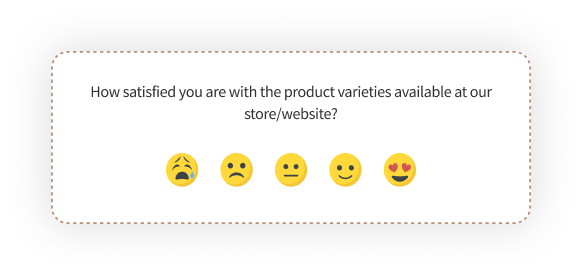
7. Staff and Service related Questions
Service-related questions focus on getting customer feedback related to the customer service your retail brand provides. Many shoppers have a great experience with the products and store but even a single customer service issue can hamper their experience and turn them into detractors.
You can ask these questions in your retail surveys to obtain feedback regarding your customer service.
- How satisfied are you with our customer service?
- How would you rate the behavior and service of our staff?
- How would you rate the efficiency of our staff in terms of proactiveness and assistance?
- Are you happy with the after-sales services provided to you?
- Do you feel that our customer service can be made better?
- Were the staff members able to resolve your queries and issues?
- How would you rate our staff’s knowledge about the products and services offered and available at the store?
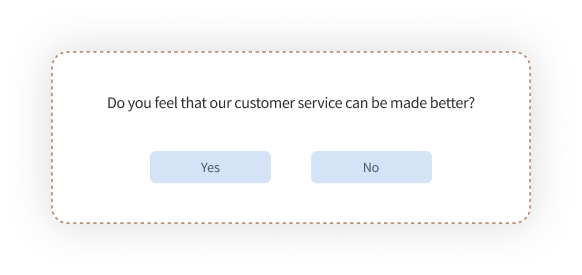
8. Place, Time & Location related Questions
When you are running a retail store, it may happen that customers like your products and services but the location of your store is somewhat not easily accessible or comfortable for them. At times, it can become a major factor affecting your in-store experiences and sales. Moreover, the environment of the store also affects the purchase decisions of the buyers.
Here are some of the questions you should ask your customers in your retail surveys:
- Do you find our store is conveniently located and easily accessible?
- How frequently do you visit this market?
- How appropriate do you feel the opening hours of our store are?
- How do you rate the environment and ambiance of our store?
- How do you rate the store decor and lighting of our store?
- Are you comfortable and satisfied with the parking facility?
- Have you faced any issues related to the availability of car parking spaces so far?
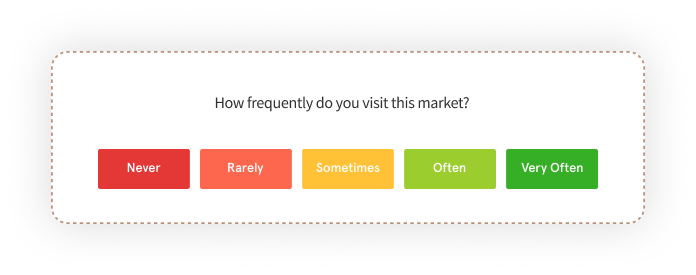
9. Billing Feedback Questions
Billing is also a crucial part of customer experience at retail stores. Long billing queues can even lead to customers leaving without making the final purchases. So your billing process must be quick, easy, and comfortable for the customers.
Here are some retail survey questions to measure the satisfaction of your customers with their billing experience at your store:
- How would you rate the overall billing experience you had in this retail store?
- Do you agree that sufficient payment options were available at this store to pay your bills?
- How would you rate our billing process on the basis of ease and quickness?
- Did you find any unexpected charges and fees on your bill?
- Did you face any issues during the billing and payment process?
- How satisfied are you with the overall billing and checkout process?
- Based on your recent billing experience, how likely are you to recommend our retail store to your friends and known ones?
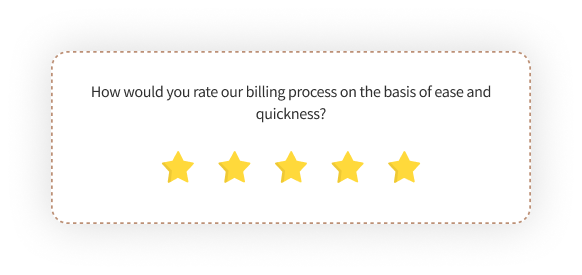
10. Pricing Feedback Questions
When you are in a competitive industry like Retail Market, it is necessary to keep your prices competitive in the market.
Here are some retail survey questions to measure the satisfaction of your retail store customers regarding the pricing of your products.
- How would you rate the pricing of the products and services at our store?
- Do you agree that the prices of the goods are reasonable at our store?
- Do you agree that the prices are reasonable according to the quality of the products at this retail store?
- Were there any products at our store that you feel are overpriced?
- How satisfied are you with the value for money of the products you purchased?
- Do you agree that sufficient offers and discounts are available in this retail store?
- Do you agree that the prices of the products at our retail store are accurately reflected?
- How would you rate the return and refund policies at the store?
- Did you find any hidden prices of taxes applied to your purchases?
- Based on the pricing, discounts, and offers at our retail store, how likely are you to recommend us to your friends and colleagues?
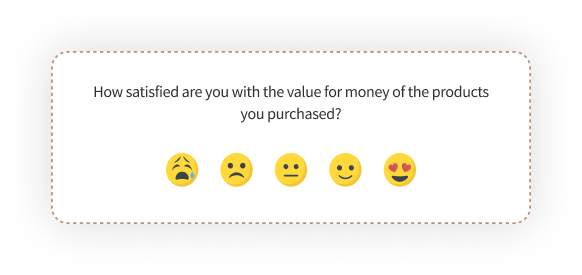
11. Loyalty Program Sign-up
A loyalty program is a great way to reward your loyal customers and encourage them to keep coming back to your retail store or website. By offering exclusive discounts, special promotions, and personalized offers, you can create a sense of customer loyalty and make your customers feel valued.
To gauge the effectiveness of your loyalty program, it's important to ask your customers about their experience with signing up for the program.
Here are some details you can ask in your sign-up form:
-
Contact Information:
- Full Name
- Email Address
- Phone Number (optional)
-
Personal Details:
- Date of Birth (for birthday rewards)
- Gender (optional, for personalized offers)
-
Communication Preferences:
- Opt-in for Email Updates
- Opt-in for SMS Alerts
-
Program Engagement:
- How did you hear about our loyalty program?
- What motivated you to join our loyalty program?
-
Shopping Preferences:
- Preferred Store Location (if applicable)
- Frequency of Purchases
- Preferred Product Categories
-
Feedback and Improvement:
- Are there specific products or services you'd like to see as part of the loyalty program?
- Any additional comments or suggestions for improving the program?
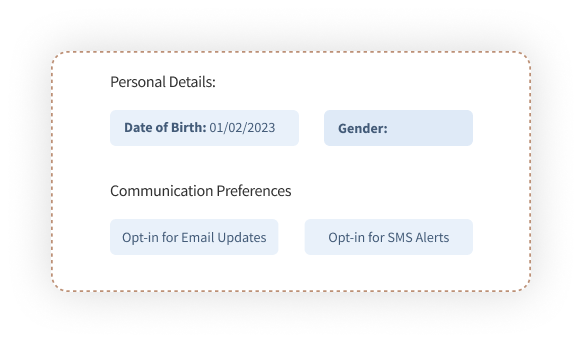
11. Open-ended Retail Survey Questions
Open-ended questions are those where you give your customers a free space to write whatever they feel about their Customer Experience. In these questions, answer choices are not given, rather, customers write everything in their own words. There are some advantages and disadvantages of open-ended questions.
The major advantage is that you get rich data in the form of real customer feedback and insights in their own words. However, you should not use more of such questions as they make the survey time-consuming thereby provoking the customer to leave the survey in between thus resulting in a low response rate. You can include some open-ended questions like these:
- How would you describe the overall shopping experience at our store/website?
- What do you like the most about our brand?
- What change would you like to be made at our store?
- If you find the store closed for some days, which other store would you prefer for shopping?
- What did you dislike about our store?
- What product brands do you think should be present at our store but were not there?
- Do you want to suggest anything to us? If yes, please write your suggestion here.
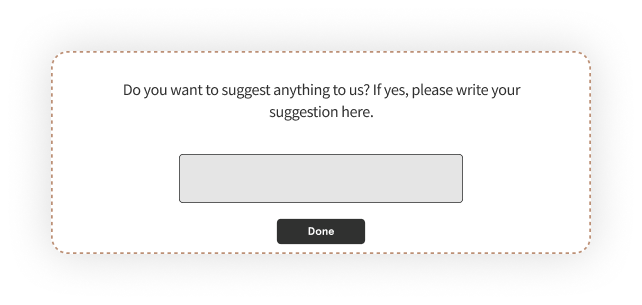
12. Follow-up Questions for your Retail Surveys
Follow-up questions are those that you can use after an answer, usually to know the reason behind their answer or answer choice. They are usually open-ended questions that you can use along with an NPS, CSAT, or CES survey, 1 to 5 rating surveys, smiley face surveys, Likert scale surveys, binary (yes/no type), and other quantitative questions to know the reason for the particular answer choices.
Moreover, can follow up with the customers regarding specific feedback or an issue. Some examples of these questions are:
- Would you please let us know the reason behind such a rating?
- Could you tell us why you chose this option?
- It would be nice to know what made you feel so.
- Would you please suggest the other way round that could make you feel better?
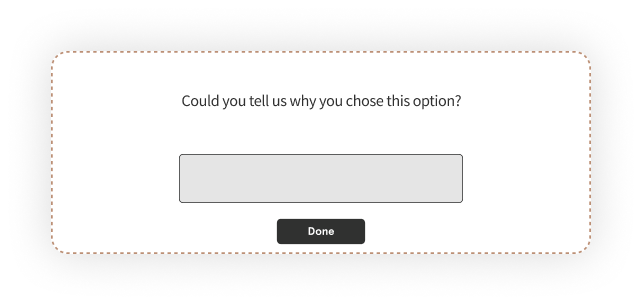
Best Practices to Create Retail Store Surveys
Along with using the right retail survey questions, you should also follow some best practices to achieve a good response rate on your retail feedback surveys. Here are some best practices to follow while you conduct customer satisfaction surveys.
1. Keep your Surveys Short and Simple
No customer has enough time to fill long and complex survey forms. So always keep your surveys short and to the point so that customers can quickly take the survey and fill up the answers without needing to think a lot and spend much of their precious time. Time-consuming surveys can be left half-filled.
2. Collect Feedback through Multiple Channels
Giving multiple options to the customers for taking the survey can help you achieve a better response rate. You can use both in-store as well as online ways to collect survey responses. You can set up unattended kiosks to gather customer feedback and assess customer satisfaction in your retail store itself where the customers can themselves approach the kiosk survey and fill out the survey without requiring any guidance.
You can also send emails and text messages to the customers just after a transaction or bill payment to gauge the customers’ recent shopping experience.
3. Include Questions about Every Aspect
Customer Experience can be different at multiple touchpoints. So use voice of customer surveys to listen to what your customers are saying about every aspect of their shopping to know your strengths and identify the weak areas where you need to work to improve Customer Experience.
4. Take Action and Close the Feedback Loop
Gathering Customer Feedback and not taking any action on it defeats the entire purpose of conducting Customer Satisfaction Surveys. So whenever you collect Customer Feedback, do respond to the customers’ responses, take action wherever required, and close the feedback loop effectively. This conveys to the customers that you listen to them and that your feedback surveys are worth spending time on.
5. Use an Effective Retail Survey Software
Gone are the days when businesses presented paper forms to customers. For conducting surveys and to be able to analyze the responses, it is essential to have good retail feedback software in place. An effective tool helps you create various surveys including metric surveys like NPS, CSAT, and CES to measure Customer Satisfaction and experience.
Moreover, there are several other advantages of using a retail feedback system at your offline store:
- You can analyze the survey response, get survey response reports, take action on feedback, and close the feedback loop effectively.
- You can measure shopper satisfaction and identify areas of improvement
- You can track the staff performance by asking shoppers to rate salespersons, store managers, and others on different metrics
- You can effectively manage complaints, get real-time alerts, and assign tasks to respective team members to reduce churn
- You can also run in-store loyalty programs to track repeat customers
Conclusion
Retail surveys are effective in gauging in-store customer experience. The key is to include the right questions to find meaningful customer insights about their experience at your store. Moreover, you should follow some best practices like keeping the survey short and simple, sharing them through multiple channels, and using effective retail feedback system that can change the game.
Zonka Feedback is one of the best Retail Feedback Apps that can help you serve the purpose. It provides you various ready-to-use customizable templates to create surveys of any type and share them with your customers through multiple channels. It also enables you to analyze the survey responses through its advanced reporting and analytical capabilities, and take action on feedback to close the feedback loop effectively.
You can schedule a demo to see how it works for your retail store business.

